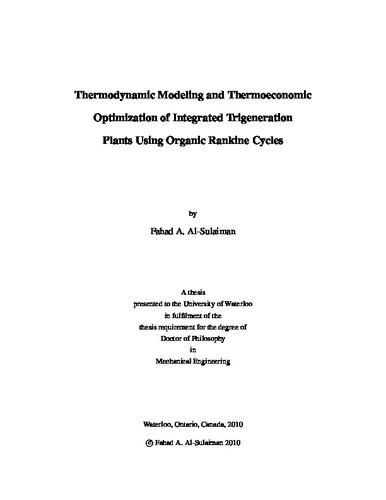| dc.description.abstract | In this study, the feasibility of using an organic Rankine cycle (ORC) in trigeneration plants is examined through thermodynamic modeling and thermoeconomic optimization. Three novel trigeneration systems are considered. Each one of these systems consists of an ORC, a heating-process heat exchanger, and a single-effect absorption chiller. The three systems are distinguished by the source of the heat input to the ORC. The systems considered are SOFC-trigeneration, biomass- trigeneration, and solar-trigeneration systems. For each system four cases are considered: electrical-power, cooling-cogeneration, heating-cogeneration, and trigeneration cases. Comprehensive thermodynamic analysis on each system is carried out. Furthermore, thermoeconomic optimization is conducted. The objective of the thermoeconomic optimization is to minimize the cost per exergy unit of the trigeneration product. The results of the thermoeconomic optimization are used to compare the three systems through thermodynamic and thermoeconomic analyses. This study illustrates key output parameters to assess the trigeneration systems considered. These parameters are energy efficiency, exergy efficiency, net electrical power, electrical to cooling ratio, and electrical to heating ratio. Moreover, exergy destruction modeling is conducted to identify and quantify the major sources of exergy destruction in the systems considered. In addition, an environmental impact assessment is conducted to quantify the amount of CO2 emissions in the systems considered. Furthermore, this study examines both the cost rate and cost per exergy unit of the electrical power and other trigeneration products.
This study reveals that there is a considerable efficiency improvement when trigeneration is used, as compared to only electrical power production. In addition, the emissions of CO2 per MWh of trigeneration are significantly lower than that of electrical power. It was shown that the exergy destruction rates of the ORC evaporators for the three systems are quite high. Therefore, it is important to consider using more efficient ORC evaporators in trigeneration plants. In addition, this study reveals that the SOFC-trigeneration system has the highest electrical energy efficiency while the biomass-trigeneration system and the solar mode of the solar trigeneration system have the highest trigeneration energy efficiencies. In contrast, the SOFC-trigeneration system has the highest exergy efficiency for both electrical and trigeneration cases. Furthermore, the thermoeconomic optimization shows that the solar-trigeneration system has the lowest cost per exergy unit. Meanwhile the solar-trigeneration system has zero CO2 emissions and depends on a free renewable energy source. Therefore, it can be concluded that the solar-trigeneration system has the best thermoeconomic performance among the three systems considered. | en |

